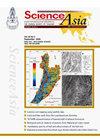上皮性卵巢癌症EAPP表达升高与预后不良相关并促进肿瘤进展
IF 0.6
4区 综合性期刊
Q3 MULTIDISCIPLINARY SCIENCES
引用次数: 0
摘要
已知e2f相关磷酸化蛋白(EAPP)参与肿瘤进展。然而,其在上皮性卵巢癌(EOC)中的分子机制尚不清楚。在本研究中,我们发现EAPP在EOC组织中的表达明显高于非肿瘤组织,并且EAPP表达异常与EOC的组织学分级(p = 0.019)、FIGO分期(p = 0.003)、组织学亚型(p = 0.019)、淋巴结转移(p = 0.024)、远处转移(p = 0.007)、Ki-67表达(p < 0.001)显著相关。EAPP高表达患者的总生存率明显低于EAPP低表达患者。更重要的是,单因素和多因素分析表明,EAPP表达水平和远处转移是EOC患者预后的独立危险因素。此外,我们证明了使用siRNA抑制EAPP与人类EOC细胞系SK-OV-3细胞的细胞增殖降低、迁移和侵袭能力降低有关。总之,我们的研究表明,EAPP的高表达可能预示着预后不良,并在EOC的进展中发挥重要作用。因此,EAPP可以作为EOC患者的潜在生物标志物和新的治疗靶点。本文章由计算机程序翻译,如有差异,请以英文原文为准。
Elevated expression of EAPP is associated with poor prognosis and promotes tumor progression in epithelial ovarian cancer
: E2F-associated phospho-protein (EAPP) is known to be involved in tumor progression. However, its molecular mechanisms in epithelial ovarian cancer (EOC) remain unclear. In the present study, we found that EAPP expression was significantly higher in EOC tissues than in nontumor tissues, and aberrant EAPP expression was significantly correlated with histological grade ( p = 0.019), FIGO stage ( p = 0.003), histological subtype ( p = 0.019), lymph node metastasis ( p = 0.024), distant metastasis ( p = 0.007), and Ki-67 expression ( p < 0.001) in EOC. Patients with high EAPP expression had a significantly lower overall survival rate than those with low EAPP expression. More importantly, univariate and multivariate analyses suggested that the EAPP expression level and distant metastasis are independent prognostic risk factors for EOC patients. Furthermore, we demonstrated that EAPP inhibition using siRNA was associated with decreased cell proliferation and reduced migratory and invasive capability of SK-OV-3 cells, a human EOC cell line. Together, our study reveals that high expression of EAPP may indicate poor prognosis and play an essential role in EOC progression. EAPP may, therefore, serve as a potential biomarker and a novel therapeutic target for EOC patients.
求助全文
通过发布文献求助,成功后即可免费获取论文全文。
去求助
来源期刊

Scienceasia
MULTIDISCIPLINARY SCIENCES-
CiteScore
1.70
自引率
33.30%
发文量
102
审稿时长
1 months
期刊介绍:
ScienceAsia is a multidisciplinary journal publishing papers of high quality bimonthly, in printed and electronic versions, by the Science Society of Thailand under Royal Patronage and the National Research Council of Thailand. The journal publishes original research papers that provide novel findings and important contribution to broad area in science and mathematics. Areas covered include Biological Sciences and Biotechnology, Chemistry and Material Sciences, Environmental and Applied Sciences, and Mathematics and Physical Sciences. Manuscripts may report scientifically useful data, observations or model predictions, and/or provide a new scientific concept or a new explanation of published results. Submissions of materials of current scientific interest are highly welcome, provided that there is sufficient scientific merit. The journal will not accept manuscripts which have been published or are being considered for publication elsewhere, nor should manuscripts being considered by ScienceAsia be submitted to other journals. Submitted manuscripts must conform to the guidelines given in the Instructions for Authors
 求助内容:
求助内容: 应助结果提醒方式:
应助结果提醒方式:


